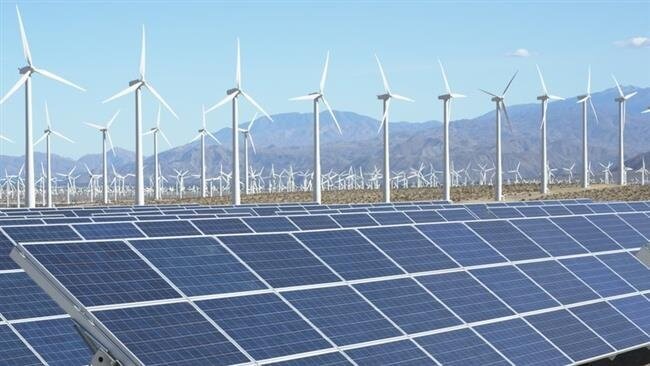
Iran generates 4.405b Kwh of electricity from renewables since March

The data provided by SATBA also put the electricity generated from renewable resources at 76 million Kwh in the eight Iranian calendar month of Aban (October 23-November 22).
Generating 4.405 billion Kwh of electricity from renewables has led to economizing on consumption of fossil fuels by 1.251 billion cubic meters and water by 969 million liters, while preventing the emission of Green House Gases (GHG) by 3,022 tons during the mentioned period of time.
Speaking in the opening ceremony of Iran’s 4th Renewable Energy Conference in mid-October, Homayoun Haeri, the deputy minister of energy for electricity affairs, said “The country’s renewable electricity generation capacity will rise to 1000 MW by the end of the current [Iranian calendar] year (March 19, 2020).”
He noted that Iran has good sources of renewable energy in addition to its huge fossil energy resources, adding that currently, 60,000 MW of wind energy potential has been identified across the country.
Haeri further stressed the growing role of renewable power plants in the country’s energy basket, saying “the country’s renewable power plants provided over 500 MW of electricity to the country’s power network during the peak consumption period in summer.”
Renewables, including hydropower, account for just six percent of energy generation, versus natural gas’ 90 percent share.
Overall, in the next five years, Iran is aiming for a 5,000 MW increase in renewable capacity to meet growing domestic demand and expand its presence in the regional electricity market.
According to SATBA, the number of small scale solar power plants across the country which are used by households or small industries is being increased noticeably as Iranian households and small industries have embraced the new technology with open arms and investors also seem eager for more contribution in this area.
Back in February, Head of SATBA Seyed Mohammad Sadeqzadeh announced that Iran also plans to add electricity generated from renewable sources to the export backset.


Trump weighs using $2 billion in CHIPS Act funding for critical minerals

Codelco cuts 2025 copper forecast after El Teniente mine collapse

Electra converts debt, launches $30M raise to jumpstart stalled cobalt refinery

Barrick’s Reko Diq in line for $410M ADB backing

Abcourt readies Sleeping Giant mill to pour first gold since 2014

Nevada army depot to serve as base for first US strategic minerals stockpile

SQM boosts lithium supply plans as prices flick higher

Viridis unveils 200Mt initial reserve for Brazil rare earth project

Tailings could meet much of US critical mineral demand – study

Kyrgyzstan kicks off underground gold mining at Kumtor

Kyrgyzstan kicks off underground gold mining at Kumtor

KoBold Metals granted lithium exploration rights in Congo

Freeport Indonesia to wrap up Gresik plant repairs by early September

Energy Fuels soars on Vulcan Elements partnership

Northern Dynasty sticks to proposal in battle to lift Pebble mine veto

Giustra-backed mining firm teams up with informal miners in Colombia

Critical Metals signs agreement to supply rare earth to US government-funded facility

China extends rare earth controls to imported material

Galan Lithium proceeds with $13M financing for Argentina project

Kyrgyzstan kicks off underground gold mining at Kumtor

Freeport Indonesia to wrap up Gresik plant repairs by early September

Energy Fuels soars on Vulcan Elements partnership

Northern Dynasty sticks to proposal in battle to lift Pebble mine veto

Giustra-backed mining firm teams up with informal miners in Colombia

Critical Metals signs agreement to supply rare earth to US government-funded facility

China extends rare earth controls to imported material

Galan Lithium proceeds with $13M financing for Argentina project

Silver price touches $39 as market weighs rate cut outlook

















